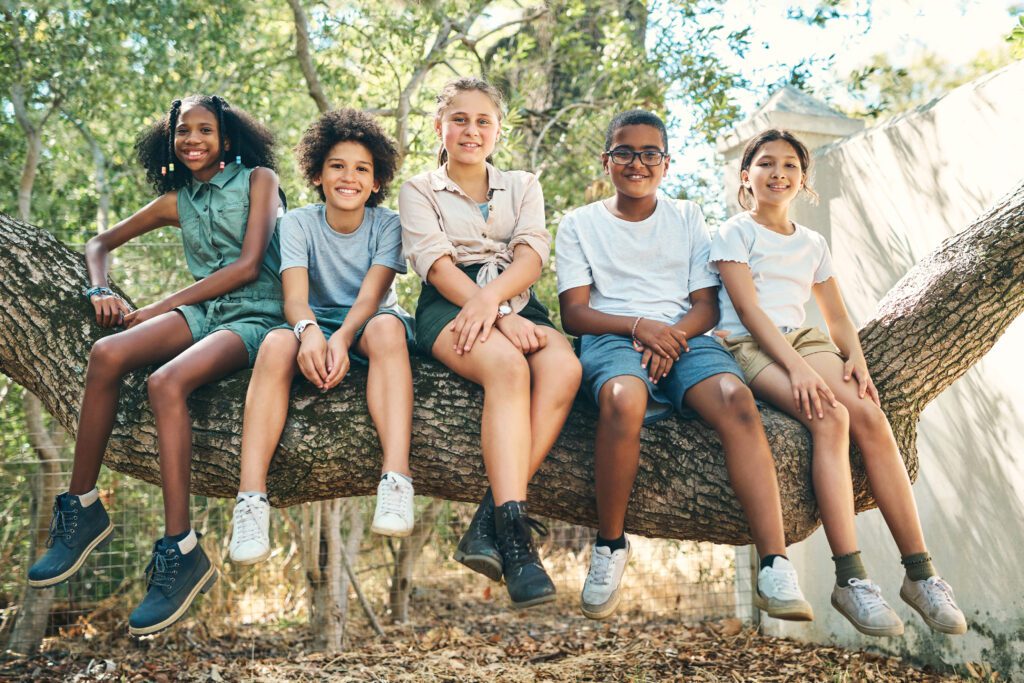Off to Camp
Summer camp experiences are valuable for children’s development in a myriad of ways, like gaining independence and friendship-building skills! Here, we highlight why being unplugged and having new experiences can be beneficial for your child as well as how to avoid homesickness, plus tips for choosing the right kind of camp for your family.
The Benefits of Being Unplugged and Outdoors
- The more meaningful experiences children have in nature, the more they’ll develop interest in caring for and preserving the environment.
- The blue light of screens reduces melatonin levels, so your kids may sleep better with less screen time.
- Spending time in the great outdoors can improve academic performance and reinforce creativity and problem-solving skills.
- There’s a clear correlation between physical health and brain health – exercise keeps the mind sharp, and being outdoors can help improve memory.
- Having limited access to screens can improve relationships and friend-making skills by making it easier to fully focus on people and make deeper connections.
- Playing in nature allows children to develop autonomy and learn about their own capabilities, which builds confidence.
- Time spent in the outdoors can decrease aggression and ADHD symptoms.

Helpful Hints for Handling Homesickness
When it comes to summer camp, one of the biggest worries for both parents and children is homesickness, but there are many ways to help your kids deal with those negative feelings when they arise – and even prevent them altogether!
Prepare, Prepare, Prepare
It’s important to start prevention tactics and set expectations early. Make a visit to the camp ahead of time if possible, or look at photos or a virtual tour to help familiarize you and your child with what will be their environment. This helps eliminate some fears of the unknown. If your child doesn’t have a lot of experience spending nights away from home, schedule some practice sleepovers with friends or family.
Practical Coping Mechanisms


Teaching your child practical ways to deal with their anxiety will have lasting benefits far beyond any difficulties they may have at summer camp. Some of the simplest ways to help kids calm themselves down when they’re feeling anxious are breathing exercises, like box breathing, or even just stopping what they’re doing and taking slow, deep breaths until they feel a little more settled. You can also teach them positive self-talk to reframe their perspectives, like, “I am safe. Even though this is a new environment, I can have fun. I’m proud of myself for trying something new.”
Plan for Next Year
Avoid promising to pick your child up from camp if they’re struggling – even if you receive the dreaded phone call begging to come home. Acknowledge their feelings and make space for them, but make it clear that you are supporting them as they work through it on their own. Help them make a commitment to sticking this session out. Suggest that if it doesn’t go well or they don’t want to try again, you can make a new plan together for next summer.
Packing and Post Cards
There are several items you can pack with your child to help them cope with loneliness and homesickness. Send some items that remind them of home, like a stuffed animal or a family photo. You can also spritz a t-shirt or handkerchief with your perfume, aftershave, or laundry detergent and pack it in a plastic bag to preserve the scent of home for whenever your child needs something familiar.
Write your child often, but don’t mention how much you miss them or any fun things they might be missing out on at home. Instead, ask questions about the activities they’re doing at camp or about the new skills they’re tackling. Don’t forget to encourage them often and remind them how proud you are of them for trying something new.
Choosing the Right Camp
According to the American Camp Association, there are more than 16,000 camps across the country, so choosing the right one for your family can be overwhelming! Read on for three tips for choosing the perfect summer experience for your child.
1. Budget
Deciding how much you’re able to spend on a camp experience will help you narrow down your choices in type, duration, and location. Typically, day camps are a bit more cost-effective than overnight camps, though some organizations may offer scholarships.
2. Day Camp vs. Overnight Camp
Include your kids in this conversation to help determine whether they’re ready for an intensive sleep away camp opportunity or if it may be best to start with a day camp near your home.


Think about the size of enrollment that your child may be most comfortable with and the ratio of campers to counselors. It’s also important to account for the logistics of scheduling and transportation.
3. Specialties
There are many specialty camps that focus on various interests, so consider your child’s goals and the activities they tend to enjoy. Think about whether they would benefit from a traditional camp or whether they would be interested in a camp that focuses on STEM, art, music, sports, cooking, or even urban exploration. If your child has special needs or dietary restrictions, be sure to investigate any potential camp’s ability to accommodate these needs.

